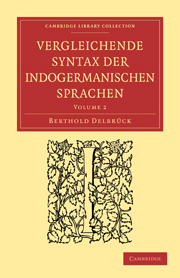Book contents
- Frontmatter
- Vorrede
- Inhaltsangabe
- Abkürzungen
- Kapitel XVI Tempora und Aktionen
- Kapitel XVII Die charakterisierten Präsensbildungen im Altindischen und Griechischen
- Kapitel XVIII Die aus einsilbigen Wurzeln gebildeten Formen (Präsentia und Aoriste)
- Kapitel XIX Die Formen aus Wurzeln auf o (mit o?)
- Kapitel XX Die Verba auf eiō
- Kapitel XXI Die indogermanischen Präsensaktionen im Germanischen und Slavischen
- Kapitel XXII Perfektivierung durch Verbindung mit Präpositionen
- Kapitel XXIII Das Perfektum
- Kapitel XXIV Die Aoriste
- Kapitel XXV Das Futurum
- Kapitel XXVI Mehrere Wurzeln zu einem Verbum vereinigt
- Kapitel XXVII Die Indikative im Arischen und Griechischen
- Kapitel XXVIII Die Indikative im Italischen, Germanischen, Litauischen, Slavisclien
- Kapitel XXIX Die Modi im Arischen und Griechischen
- Kapitel XXX Die Modi in den übrigen Sprachen
- Kapitel XXXI Die Genera Verbi im Arischen und Griechischen
- Kapitel XXXII Die Infinitive
- Kapitel XXXIII Partizipia und Verbaladjektiva
- Kapitel XXXIV Die Partikeln
- Index der Verbalformen
- Sach-Index
- Nachträge und Berichtigungen
Kapitel XXIX - Die Modi im Arischen und Griechischen
Published online by Cambridge University Press: 05 August 2011
- Frontmatter
- Vorrede
- Inhaltsangabe
- Abkürzungen
- Kapitel XVI Tempora und Aktionen
- Kapitel XVII Die charakterisierten Präsensbildungen im Altindischen und Griechischen
- Kapitel XVIII Die aus einsilbigen Wurzeln gebildeten Formen (Präsentia und Aoriste)
- Kapitel XIX Die Formen aus Wurzeln auf o (mit o?)
- Kapitel XX Die Verba auf eiō
- Kapitel XXI Die indogermanischen Präsensaktionen im Germanischen und Slavischen
- Kapitel XXII Perfektivierung durch Verbindung mit Präpositionen
- Kapitel XXIII Das Perfektum
- Kapitel XXIV Die Aoriste
- Kapitel XXV Das Futurum
- Kapitel XXVI Mehrere Wurzeln zu einem Verbum vereinigt
- Kapitel XXVII Die Indikative im Arischen und Griechischen
- Kapitel XXVIII Die Indikative im Italischen, Germanischen, Litauischen, Slavisclien
- Kapitel XXIX Die Modi im Arischen und Griechischen
- Kapitel XXX Die Modi in den übrigen Sprachen
- Kapitel XXXI Die Genera Verbi im Arischen und Griechischen
- Kapitel XXXII Die Infinitive
- Kapitel XXXIII Partizipia und Verbaladjektiva
- Kapitel XXXIV Die Partikeln
- Index der Verbalformen
- Sach-Index
- Nachträge und Berichtigungen
Summary
Allgemeines
Über die Geschicbte der Moduslehre besitzen wir zwei inhaltreiche und feine Programme von K. Koppin (Beitrag zur Entwickelung und Würdigung der Ideen über die Grundbedeutungen der griechischen Modi (Wismar 1877 und Stade 1880), auf die ich den Leser im allgemeinen verweise. An dieser Stelle betrachte ich nur die wichtigsten Etappen, wobei ich, wie es in der Einleitung geschehen ist, hauptsächlich auf den Einfluss der philosophischen Systeme hinweise. Die Ansichten der Griechen, von denen auch bei der Moduslehre auszugehen ist, flnden sich in der Techne des Dionysios Thrax in den Worten: ευχλ íσ€lσ (μεν ουν €íσ πí€ντ€, ορíστíχη, προσταυτιυη, €υχτιχη, υποταχτιχη áπαρ€μ πατοσ. Dazu ist unsererseits zu bemerken, dass wir den Infinitiv bei Seite lassen, und dass aus dem Ausdruck ευχλ íσ€lσ nichts zu entnehmen ist. Dagegen enthalten die anderen Ausdrücke Anschauungen, welche auch fiir die Folgezeit herrschend geblieben sind. Der Indikativ (ορíστíχη]) ist der Modus, welcher beim Definieren, Erklaren, Behaupten gebraucht wird, der Imperativ (προσταυτιυη) ist die Form des Verbums, mittelst welcher man befiehlt, anordnet, der Optativ ist die Wunschform. So aufgefasst, bezeichnen also die genannten Modi eine äusserung, insofern sie aus einer Seelenstimmung des Redenden hervorgeht. Zwar meint Steinthal, Gesch. der Sprachw.2 2, 278, Apollonios habe, wenn er die Begriffe Befehl und Wunsch gebrauchte, stets an zwei Peisonen gedacht, n'amlich sowohl an die betroffene, als an die thatige, aber ich halte es doch für wahrscheinlich, dass die von mir angedeutete Auffassung die ursprüngliche gewesen sei.
- Type
- Chapter
- Information
- Vergleichende Syntax der indogermanischen Sprachen , pp. 346 - 372Publisher: Cambridge University PressPrint publication year: 2010First published in: 1897



